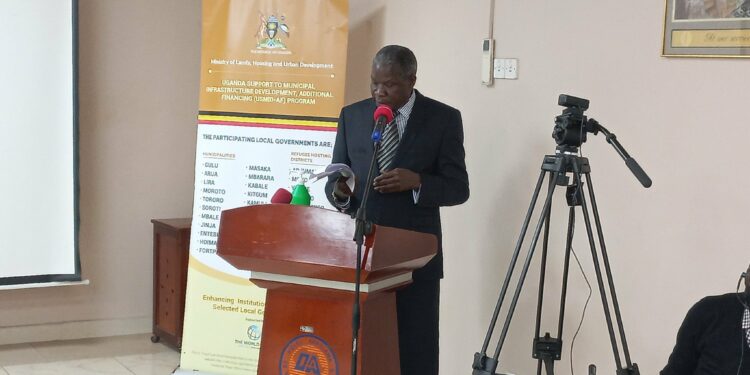The Minister of State for Urban Development Mr Kania Obiga has cautioned the cities and urban areas of Uganda to change the way they grow and instead plan for sustainable resilient cities in regards to the management of urban hazards.
This was during the commemoration of World Cities Day celebrated annually on 31st October under a general theme “Better City, Better life”. This year, the day is celebrated under a sub-theme “Adapting Cities for Climate Resilience”.
Minister Obiga pointed out climate change as one of the key emerging issues that cities must contend with, noting that the cities’ impacts due to climate change are a frontline challenge for them today.
“Cities and other urban areas like Municipalities and town councils are both drivers and victims of climate change. As cities expand, they engulf environmental and ecological systems like floodplains, forests, and wetlands that naturally exist,” he noted.
According to the minister, urbanization together with other interlinked forces will always create demand for space and resources which are all finite! And as a result contribute to natural and man-made disasters such as land degradation, deteriorating air and water quality, poor solid waste management, inadequate greenery for residents, flooding and fire which have potentially serious consequences on human health, livelihoods and urban assets.
The risks are anticipated to be even higher in un-planned areas where inadequate infrastructure leaves the urban poor and other vulnerable groups in informal settlements exposed to environmental hazards.
Mr Obiga warned that if focus and action is not taken, regional cities will be affected by climatic changes and emergencies whose cost due impacts of climate change can expand exponentially each year.
“The results of any inaction will go on to exacerbate the litany of problems in the cities and other urban areas already struggling with low household income, inadequate finances from own source revenue to deliver critical urban services, inadequate innovations in the productive sector, inadequate green technologies for jobs, urban poverty and food insecurity,” he added.
He, therefore, recommended prompt planning for sustainable resilient cities and human settlement development, and collective efforts by all; urban residents, the political leaders, and urban managers, developers, and investors to operationalize resilience.
The Minister noted that actors should pay special focus on the regional and special cities of Uganda and support them become resilient cities by; promoting sustainable development goal 11 on sustainable and livable cities; strengthening partnerships between key players to enhance collaborations under the #UGCities4Resilience Network and making use of networks to extend essential information regarding building resilience to communities; and capturing the attention of key actors involved in the development processes of the new cities in Uganda, to institute and practice resilience from the grassroots.
Minister further urged the cities to strive at tackling how climate and non-climate drivers of change together in order to build resilience.
“All regional cities should come up with sustainable city designs and practices that anticipate and respond to potential risk and opportunities; be innovative by adopting new planning approaches besides the conventional methods; consider urban safety by making use of risk-based land-use planning practices to identify the safest areas to prioritize investments for urban development and infrastructure projects. Investors look for low risk and sustainable areas to invest in the long term.” He observed.
Do you have a story in your community or an opinion to share with us: Email us at editorial@watchdoguganda.com













